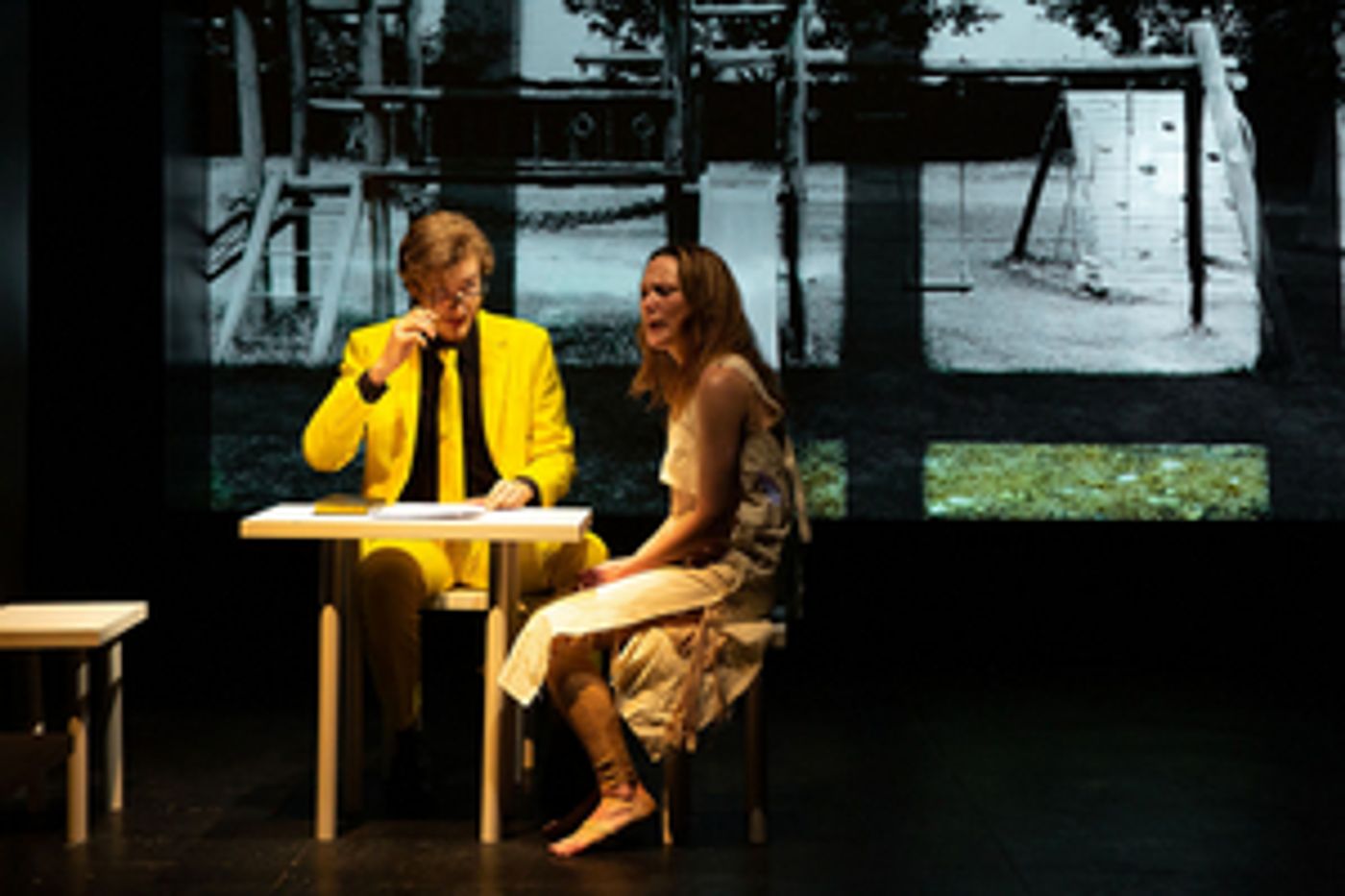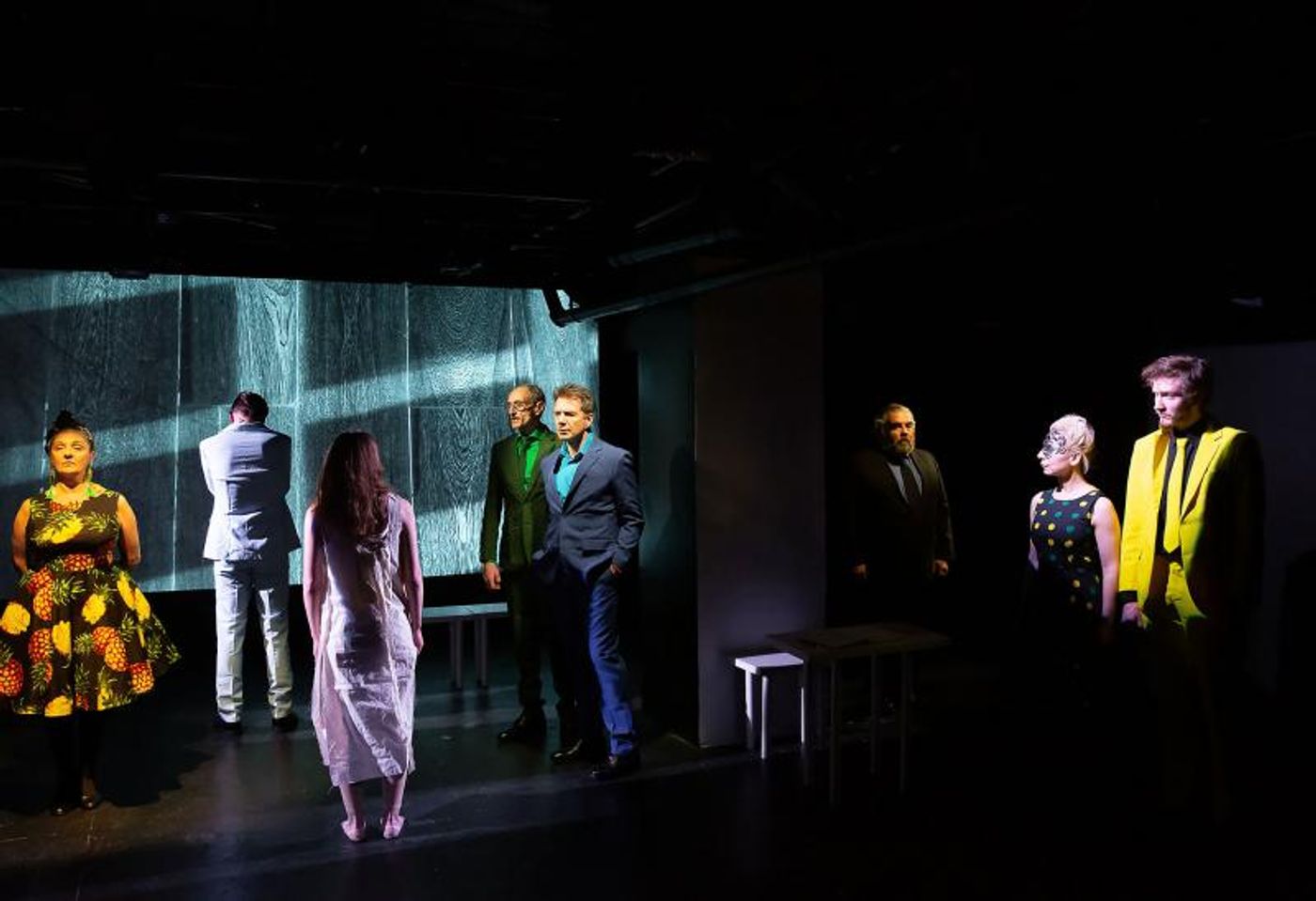Review: NEAR TO THE WILD HEART at The New Stage Theatre Company

Dark, deep, mysterious and moving, Near to the Wild Heart echoes the voice and valor of the award-winning 1943 novel by Jewish-Brazilian author Clarice Lispector. Like the digital aquatic imagery that often spans the upstage perimeter, the play ebbs and flows through one woman's interior and exterior selves as she reflects on the reality of her relationships.
Translated by Alison Entrekin and adapted/directed by Ildiko Nemeth, Near to the Wild Heart beautifully merges the physical life with the metaphysical musings of the female protagonist, Joana (Sarah Lemp). Even as a child she contemplates her role on life's stage; an omniscient Voice tells us: "Between her and the objects there was something, but whenever she caught that something in her hand, like a fly, and then peeked at it--though she was careful not to let anything escape-she only found her own hand, rosy pink and disappointed. She would never allow herself to say, even to her father, that she never managed to catch 'the thing.'"
Not to say that she doesn't try...and try...and try. An old soul with a reflective mind, Joana holds fast on her non-linear journey, moving beyond (but frequently revisiting) a precocious childhood. Across 18 chapter-scenes, Lemp emotes the many facets of Joana: curious, contemplative, discontent, bored, yearning, inquisitive, candid and communicative.
Her clothing may be understated (unstructured muslin/gauze gown with no shoes), but Joana has plenty to say on behalf of anyone who has been stuck in a loveless marriage. There are opaque musings ("Eternity. A thought without content or form, or dimensions. Eternity is the impossibility of knowing how many human beings will succeed my body, which will one day shoot like a star, far from the present") as well as questions that cut to the core ("Who...is he? ...that stranger, this man...my man").
"This man" is Otávio (Markus Hirnigel) her handsome-and-explosive husband. He too is a vessel that holds pieces of Joana's nested narrative: "Joana told me stories of child-Joana. At first, she dreamed of sheep, of going to school, of cats drinking milk. Little by little she dreamed of blue sheep, of going to a school in the middle of the forest, of cats drinking milk from gold saucers. And her dreams grew more and more dense and took on colors hard to dilute in words."
Certain parts of the play grow more and more dense as well. Even as an avid reader, more than once I got lost in the complexity of passages that waxed more philosophical than conversational. The pace of the show is not problematic; it affords us time to settle in and follow the narrative.
Like Joana, Otávio also contemplates his place in life: "...Cowardice is lukewarm and I resign myself to it, laying down all the hero's weapons that twenty-seven years of thinking have afforded me. What am I, at this moment? A flat, silent leaf that has fallen to the ground. No gust of air swaying it. But why, first and foremost call myself a dead leaf when I am just a man with his arms folded?
With its poetic, organic and otherworldly feel, Heart conjures up the mood and elements of a love story that got ghosted; versions of Joana are suspended in a hammock and appear upstage visually as she struggles to find herself spiritually. Her monochromatic attire sets her apart from the other actors who wear chalk-bright fashions: Lisa Giobbi (Narrator, Mother, Aerial Dancer), Katalin Ruzsik (Lidia, Otávio's mistress), Gina Bonati (Aunt, Woman with a Voice), Ken Raboy (Father), Fritz Leonard Bücker (Teacher), Olimpia Dior (Teacher's Wife, Isabelle), Maciej Bartoszewski (Man), and Theodore Bouloukos (Father's Friend). Costume design is by Jessica Sofia Mitrani and Hailey De Jardins.

Mitrani's video projections provide a stunning cinematic-symbolic backdrop that remains subdued, mostly black and white, without being intrusive or disruptive to the onstage momentum, much of which is small-scale and intimate.
Cool-hued blue lighting (Federio Restrepo, Light Design) and instrumental music (ranging from Shigeru Umebayashi, Kronos Quartet, Franz Schubert and Philip Glass) helps evoke an ethereal feel throughout the 90-minute performance (Hao Bai, Sound Engineering/Programming; original music by Muriel Louveau and David Trujillo.)
Virtually impossible to reduce to a simple strand of specific related events, Near to the Wild Heart leads us to the edge where darkness and light, sand and surf, choice and complacency intersect: "Once you're happy what happens?" Joana asks. "What comes next?"
Nemeth and The New Stage Theatre Company keep us guessing, keep us wanting.
The show runs through January 18. Tickets are available here.
Photos: Nonoka Judit Sipos
Reader Reviews
Videos

